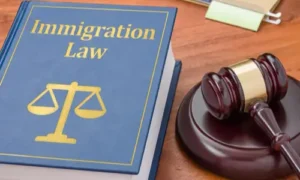Concerned about immigration issues following President Donald Trump's re-election? Click Here
 If you are an international student considering studying in Texas, one of the first steps in making your dream a reality is understanding the visa options available to you. Obtaining the appropriate visa is crucial for ensuring a smooth and legal transition into your life as a student in the United States, and a Texas lawyer can help you with the process.
If you are an international student considering studying in Texas, one of the first steps in making your dream a reality is understanding the visa options available to you. Obtaining the appropriate visa is crucial for ensuring a smooth and legal transition into your life as a student in the United States, and a Texas lawyer can help you with the process.
The F-1 visa is the most common student visa for those pursuing academic studies at an accredited U.S. college or university. To be eligible for an F-1 visa, you must be enrolled as a full-time student in a program that leads to a degree, diploma, or certificate. You will also need to demonstrate that you have sufficient financial resources to support yourself during your stay in the United States. When applying for an F-1 visa, provide:
Once you receive approval for your visa, you can enter the United States up to 30 days before the start of your academic program.
Students who wish to pursue vocational or non-academic studies at a U.S. institution can apply for the M-1 visa. This visa is suitable for those enrolled in technical schools, vocational programs, or other recognized non-academic institutions.
Similar to the F-1 visa, M-1 visa applicants must demonstrate that they have adequate funding to sustain themselves during their stay. However, the M-1 visa does not permit holders to work off-campus and restricts them to practical training opportunities directly related to their field of study.
Individuals participating in exchange visitor programs, including students, scholars, and researchers, should obtain a J-1 visa. This visa category encompasses a wide range of programs, such as study abroad, internships, and cultural exchanges.
To be eligible for a J-1 visa, you must have acceptance into a program sponsored by a U.S. government agency, educational institution, or private organization. Depending on the specific program, you may be required to demonstrate proficiency in English and provide proof of financial support.
While not a separate visa category, Optional Practical Training (OPT) is an important consideration for foreign students in Texas. OPT allows F-1 visa holders to gain practical work experience in their field of study for up to 12 months after completing their academic program.
To be eligible for OPT, you must have been enrolled as a full-time student for at least one academic year and be in good academic standing. You will need to apply for OPT through your school’s designated school official (DSO) and receive approval from U.S. Citizenship and Immigration Services (USCIS).
Studying as a foreign student can be a life-changing experience. By understanding the various types of visas available and their requirements, you will be better prepared to navigate the application process and pursue your academic goals. A Dallas County, TX immigration attorney can help you with the process. Call John W. Lawit, LLC at 214-609-2242 to get started.